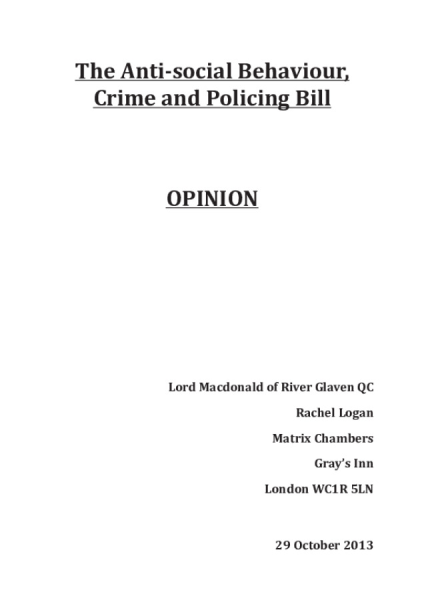
Reform Clause 1: Feel free to annoy me!
The Government is introducing a new anti-social behaviour law outlawing "annoying" behaviour. The new law, contained in clause 1 of the Anti-social Behaviour, Crime and Policing Bill, would introduce injunctions suppressing behaviour deemed to be potentially "annoying", however vague the justification.
"Injunctions to Prevent Nuisance and Annoyance" (IPNAs) would replace Anti-Social Behaviour Orders (ASBOs), which had been introduced under the Labour government. Whilst in order for an ASBO to be issued, a court has to be satisfied that someone had at least caused or threatened to cause "harassment, alarm or distress" to someone else — and that the order was "necessary" to protect the victim — the clause 1 would allow a court to impose sweeping curbs on people's liberty if it thinks they are "capable of causing nuisance or annoyance to any person", and so long as it is "just and convenient" to do so.
We argue that the nuisance or annoyance test encompasses a too-wide range of behaviour, and is too imprecise to allow people to understand what is expected of them. The proposed law does not include any clear definition of what is deemed to be annoying, or any safeguards against its abuse: it includes no defence of 'reasonableness', requires only a civil burden of proof, and would give the police powerful new dispersal powers.
Whilst we are sympathetic to the Government looking to control the problem anti-social behaviour, we are deeply concerned that the nuisance or annoyance test contained in Clause 1 is far too wide-ranging and could catch all manner of innocent, if slightly irritating behaviour. The nuisance or annoyance test is in fact already contained in law, but applies exclusively within social housing context only.
By the Government proposing to extend the concept of annoying to all forms of public activity the concern is that, because clause 1 is so-wide ranging and the concepts "annoying" and "nuisance" inherently subjective and vague, people going about their ordinary business, such as charity collectors, protestors, carol singers, street pastors could be classed as "annoying" and therefore be taken to courts.
We believe that the state should not be in the business of outlawing annoying behaviour in such a wide-ranging way, and that clause 1 fails to strike a reasonable balance between protecting the public from anti-social behaviour and protecting essential freedoms. Legislation that criminalises "annoying" behaviour represents a serious threat to public protest and free speech; freedom of expression includes the freedom to annoy, and to legislate otherwise would undermine one of the most precious freedoms we have.
That is why, as we did with the successful Reform Section 5 campaign, we are working with the Christian Institute and other civil liberty groups to campaign against the inclusion of clause 1 in the Anti-social behaviour, Crime and Policing bill.
A number of prominent groups and people have also voiced serious reservations about Clause 1. Former Director of Public Prosecutions, Lord Macdonald QC, has described the Government's plans for these new civil injunctions as amounting to gross state interference with people's private lives and basic freedoms. Organisations such as Liberty and Justice have also expressed great concern about clause 1 of the bill, as has the Parliament's Joint Committee on Human Rights.
For more information visit the campaign website at reformclause1.org.uk
Follow the campaign on Twitter @ReformClause1


